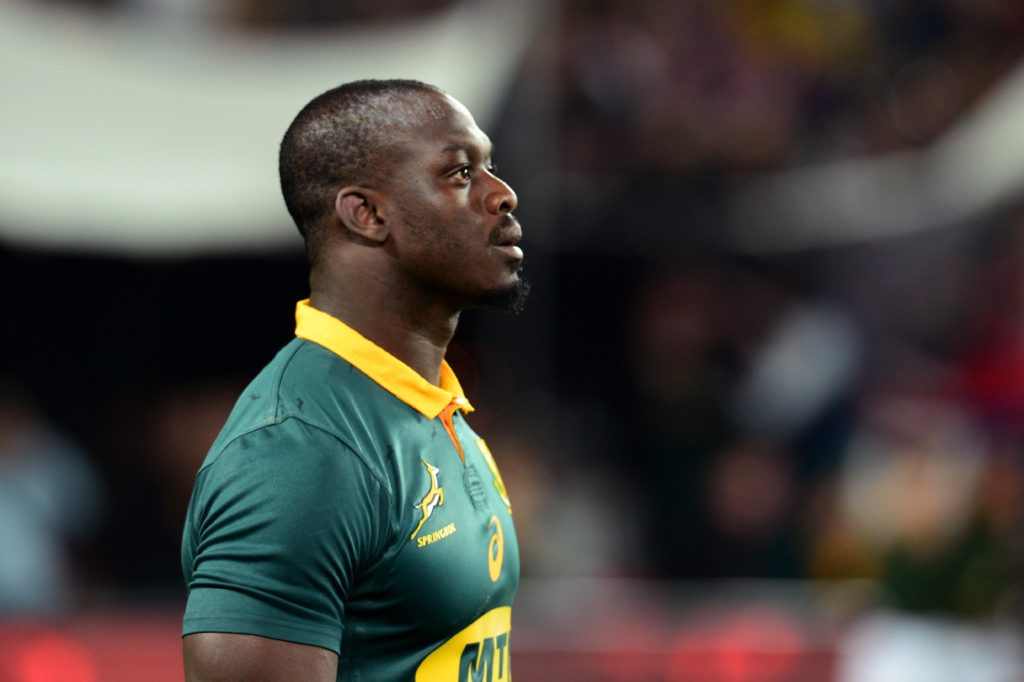
JOHANNESBURG, SOUTH AFRICA - JUNE 24: Raymond Rhule of the Springboks during the 3rd Castle Lager Incoming Series Test match between South Africa and France at Emirates Airline Park on June 24, 2017 in Johannesburg, South Africa. (Photo by Lee Warren/Gallo Images)
A recently retired Springbok rugby player has openly admitted that a combination of personal frustration and professional challenges ultimately led him to make the difficult decision to leave South Africa and pursue his career in France.

The former Springbok’s decision to leave the country, a place he once called home, has sent ripples through the rugby community. While many players seek greener pastures overseas for financial reasons or to experience different cultures, this player’s reasons run much deeper.
For many Springbok players, the journey to the national team is a pinnacle of their careers, and for this individual, it was no different. Yet despite the success and pride of wearing the Springbok jersey, he found himself growing increasingly frustrated with the dynamics surrounding South African rugby. The struggles stemmed not only from personal challenges but also from the broader political and financial uncertainties facing the sport within the Republic.
His frustration started to brew during the later stages of his career when the game, which had once been a source of pure joy and excitement, began to feel more like a battleground of disillusionment. Off-field distractions, political interference, and a shifting rugby landscape in South Africa began to overshadow his passion for the sport. The instability within the South African Rugby Union (SARU) and the on-going saga surrounding the country’s rugby finances had a considerable impact on the sport’s direction. The national team’s performance, despite its achievements, was seen as inconsistent, and players found themselves caught in a series of administrative issues that affected morale.
The player admits that at first, he tried to make peace with the constant instability. He understood that rugby was an evolving sport and that the financial constraints of South Africa were challenging. However, as the years went by, the frustration mounted. He couldn’t ignore the increasing number of players leaving South Africa for more stable opportunities abroad, particularly in France, where the rugby scene had reached unparalleled heights in terms of financial rewards, facilities, and professional growth.
His turning point came when the political landscape of South African rugby began to overshadow player development and team cohesion.

The decisions being made at the top seemed more focused on appeasing sponsors and stakeholders rather than providing the team with the necessary resources to succeed on the world stage. The player also found himself at odds with the inconsistency in coaching strategies and the lack of long-term vision within the South African setup. He felt that the leadership had failed to harness the immense talent within the country to its full potential, and as a result, the team’s performance on the international stage had begun to stagnate.
At this stage, he knew something had to change. The opportunity to move to France came at a time when he was at a crossroads in his career. After years of playing in South Africa and representing the Springboks, the chance to experience rugby in another culture and environment felt like the fresh start he so desperately needed. With the support of his family, he decided to make the leap.
Relocating to France, where the rugby environment was more financially stable and less mired in administrative challenges, proved to be a breath of fresh air. The player admitted that playing in the French league revitalized his career and provided him with a new perspective on the sport. Not only did he benefit from the increased professionalism in French rugby, but he also got the chance to immerse himself in a different rugby culture. The focus on player welfare, professional development, and a more streamlined structure for managing both club and international commitments allowed him to thrive in a way that had become difficult back home.
While he enjoyed success in France, his decision to leave South Africa was never easy. He reflected on the pride he had in representing the Springboks, but the frustration of the constant off-field challenges had taken its toll. For many players, the draw of playing in France and other overseas destinations is often about the financial rewards or a desire to explore new cultures. For him, it was about reclaiming his love for the game and finding a place where he could continue to challenge himself without the overwhelming distractions of political struggles and financial instability.
In his retirement, the former Springbok looks back with mixed emotions. He does not harbor ill feelings toward South African rugby but instead wishes that the leadership of the sport could focus more on the players’ well-being and less on the external pressures of politics and business. His frustration, he admits, was a result of his desire to see the sport grow and succeed in South Africa, but ultimately, he felt that the sacrifices and challenges became too great for him to continue in the Republic.
Reflecting on his career and his decision to retire in France, he hopes that his story will serve as a reminder to young players and administrators alike about the importance of balancing professional growth with personal well-being. For him, leaving South Africa was not about abandoning his roots, but rather about seeking the peace and stability he needed to finish his career on a high note.





